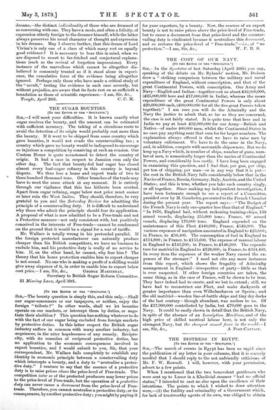[TO THE EDITOR OF THE " SPECTATOR."]
.Sin,—The bounty question is simply this, and this only,—Shall our sugar-consumers or our taxpayers, or neither, enjoy the foreign " tribute ?" In other words, shall we let bounties operate on our markets, or intercept them by duties, or nego- tiate their abolition ? This question has nothing whatever to do with the fact of our sugar being excluded from foreign markets by protective duties. In this latter respect the British sugar industry suffers in common with many another industry, but acquiesces, in the utter hopelessness of any remedy. Recipro- city, with its remedies of reciprocal protective duties, has .no application to the economic consequences involved in export bounties, and I would submit to you, Sir, that your correspondent, Mr. Wallace fails completely to establish any identity in economic principle between a countervailing duty which intercepts a bounty, and a duty to "neutralise a protec- tive duty.." I venture to say that the essence of a protective duty is to raise prices above the price-level of Free-trade. The competition inter se of the protected producers may lower prices to the price-level of Free-trade, but the operation of a protective duty can never cause a decrement from the price-level of Free- trade. Therefore, you cannot neutralise a protective duty, or its consequences, by another protective duty; you might by paying it for your exporters, by a bounty. Now, the essence of an export bounty is not to raise prices above the price-level of Free-trade, but to cause a decrement from that price-level and the counter- vailing duty is vindicated because it neutralises this decrement, and so restores the price-level of " Free-trade,"—i.e., of " no


































 Previous page
Previous page